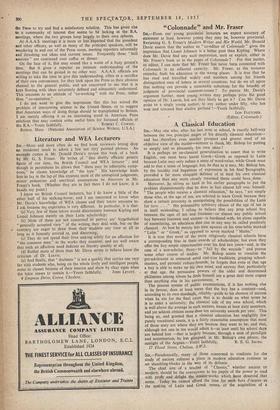A Classical Education
SIR,—May one who, after his last term at school, is exactly half-way between the two principal stages of his directly classical education— and has therefore even smaller prospect and greater need of an objective view of the matter—venture to thank. Mr. Bishop for putting so simply and so pleasantly his own ideas ? It is perhaps an un-classical generalisation to assert that to write English, one must have learnt Greek—Greek as opposed to Latin because Latin may only induce a sense of word-value, while Greek must add to that a sense of language; but, be that as it may, Mr. Bishop has, by the lucidity and happiness of expression in his final "Paragraphs, provided a far more eloquent defence of at least his own classical education than any more closely reasoned thesis could have done.
Moreover, he strives so hard in his earlier paragraphs to put the problem dispassionately that he does in fact almost fall over himself. " The people who receive a classical education," he says, " are simply those who, at the age of ten, are selected to learn Greek because they show a certain precocity in manipulating the possibilities of the Latin
for love. . . ." His presumably arbitrary choice of the age of ten is
in itself misleading; I refuse to believe that any prep school boy between the ages of ten and fourteen—or almost any public school
boy between fourteen and sixteen—is burdened with, let alone capable of assimilating, an education that can in .any way be called positively classical. At best he merely has nine squares on his time-table marked " Latin " or " Greek," as opposed to seven marked " Maths."
It is true that most of the more religiously classical schools have a corresponding bias in their awards of scholarships; but even 'they offer the boy ample opportunities over his first two years—and, in the case of a non-scholar, three—to " fall by the wayside " and pursue some other course of studies. Mr. Bishop seems to visualise the pre-adolescent as ensnared amid cast-iron traditions, grasping school- masters, and parental culture-hounds; he forgets that even at that age a boy is able to make up his own mind, and anyway that, particularly at that age, the persuasive powers of the older and determined philistines among whom he finds himself are a great deal more cogent than anything else in his environment. • The present system of public examinations, if it has nothing else in its favour, does at least mean that the boy has a constant—and,
according to its own standards, reliable—guide to his chances of success when he sits for the final exam that is to decide on what terms he is to enter a university; the classical side of my own school, which is well above the average in such matters, boasts at least sixty members, and yet seldom obtains more than ten university awards per year. This being so, and granted that a classical education has negligibly few purely vocational assets, it is a fairly reasonable assumption that most of those sixty are where they are because they want to be; and that, although not one in ten would admit it—at least until his school days are behind him —that is largely because, through a mist of paradigm and accentuation, he has glimpsed, in Mr. Bishop's own phrase, the
sunlight of the Aegean.—Yours faithfully, R. E. G. &thus. 17 Flood Street, Chelsea, S.W.3.


































 Previous page
Previous page